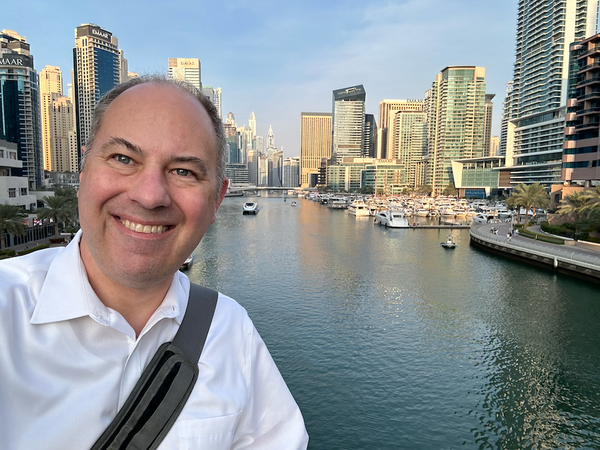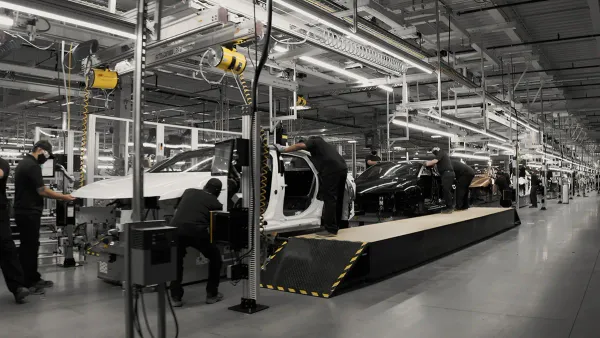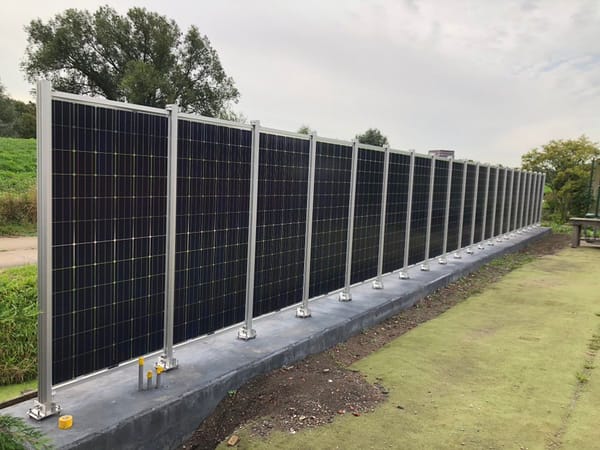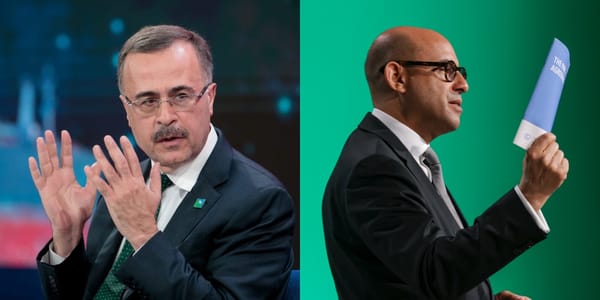The four major issues shaping up COP28, plus one more
Good Afternoon!
Countries are starting to announce their negotiating positions for Dubai and the COP28 president released a letter suggesting a structure for negotiations. We’re getting close to the meeting, so I’m working through the details of the major negotiation points in preparation for my attendance. Today I’ll illustrate some of what I’m figuring out.
-Mike
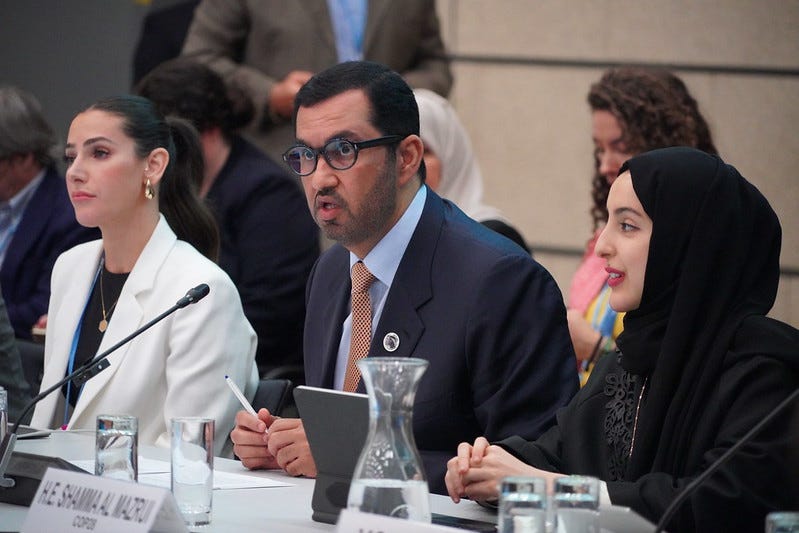
I’ve been busy talking to negotiations experts, trying to get a sense of what to expect in Dubai next month. Not surprisingly, most of the responses have been cynical. Perhaps the most cogent insight I heard was that, “climate negotiations are a pledge event,” said one former negotiator. The idea he laid out was that because the U.N. climate deals have no enforcement authority, countries just come to meetings, pledge what they’re willing to do and either do it, or not. From the most cynical perspective, there’s no repercussions for countries who don’t come through, and climate advocates are just happy to get anything at all.
That’s probably not the only way to view the meetings, but it is a useful framework: Everything is just a pledge, rather than a commitment, and it requires internal political pressure within countries to ensure the pledges are met. So, as we consider that loose system of how countries negotiate, let’s consider how next month’s meeting in Dubai is shaping up.
What is happening?
The COP28 President, Dr. Sultan Ahmed Al Jaber (who is also president of the UAE national oil company) released a letter this week laying out his priorities. Countries have also begun setting their agendas and announcing their negotiating positions in advance of COP28. Essentially, I think you can boil Dubai’s major topics down to the four major issues, plus one:
- Now that the Global Stocktake results are out, countries are expected to announce their new five year plans for emissions reductions, known as Nationally Determined Contributions. We’ll see how strict those will be.
- A fossil fuel phase-out plan will be a top issue. There are lots of ways to parse this, from “abatement” with carbon sequestration to direct cuts of use.
- Calls on rich countries to pay climate related “Loss and Damage” for developing countries and other mitigation measures.
- Spending on green development and carbon sequestration: Where will the money come from?
And the plus one isn’t so much a topic, as it is a constant undercurrent that could potentially derail the whole meeting:
- Countries continue to express discontent with COP28 President Al Jaber, who also happens to be the president of UAE’s national oil company. The COP president is not just a convener, but also meant to be an arbiter in negotiations. Plenty of countries don’t trust an oil company president to arbitrate climate discussions.
What’s the politics?
Every couple of weeks there’s some sort of global meeting on a different topic, but this year climate has managed to hijack just about every meeting. Last week’s World Bank/IMF meeting ended up being about climate finance. September’s G-20 meeting in New Delhi was disrupted by an inability to come to an emissions consensus. There’s lots of reasons why this is happening, including an increasing number of climate-related disasters, a united coalition of developing countries, and the fact that fixing climate change is coming down to finding the money to pay for it.
The U.N. Framework Convention for Climate Change, the organizing treaty for all negotiations signed in 1994, groups 198 countries into two groups, Annex I, which basically includes Japan, the various wealthy Anglo countries, the E.U., and Russia, and then everyone else, who is an “Annex II” country. In subsequent treaties, like the 2015 Paris Agreement, Annex I countries are supposed to pony up for various initiatives and make more stringent emissions reductions.
But since 1994, lots of other countries have become rich, or at least well-to-do. For instance, where does South Korea fit? How about India? Saudi Arabia and Israel? Or the big question: China, who is technically still considered a “developing country” by U.N. standards.
This COP seems to be demanding more commitments from rich countries than in the past, especially when it comes to funding developing countries’ green development. It seems likely that if there’s going to be big funding announcements, the existing Annex I countries will expect some wealthier Annex II countries to chip in, especially China and the Gulf State oil producers.
What’s the money angle?
There’s an absurd number of ways this COP could impact the global economy: Fossil fuel phase-out means less oil and coal, commitments to carbon sequestration means the creation a whole new global industry, increased spending on green energy means huge subsidies for lots of green tech companies, and refinancing developing country debt means lots of money for the finance sector.
There’s a good reason Wall Street leaders are heading to COP this year: There’s going to be all kinds of deals to be made for big finance, and essentially the creation of new major energy players. While it’s not likely that fossil fuel companies will be killed off this year, major new green energy companies could emerge as the result of savvy positioning.
What’s the potential outcome?
Because there are so many players involved and so many major issues this year, it’s hard to predict a specific outcome. Not only is there pressure from activists to reduce emissions, there’s also a growing set of financiers pressuring negotiators to advantage their green energy investments, which is a major change from past years.
There’s three ways to approach climate change mitigation: One is to stop using the sources of carbon emissions, the second is to sequester carbon, and the third is to adopt green sources that don’t use carbon in the first place. Because there’s so much financial inertia behind carbon emitting sources, I think we should expect little agreement on halting fossil fuel use. But there’s plenty of happy talk from all parties about sequestration and promoting green energy. We should expect more agreement on those approaches.
For the next four issues of Heat Rising I’m going to focus on the four major issues expected to be addressed in Dubai, the Global Stocktake, fossil fuel phase-out, climate finance, and spending on green development and sequestration. Each issue will concentrate on an issue, with political and financial ramifications. Tomorrow I’ll write about how a fossil fuel phase-out might (or kinda?) be considered.
Other Things Happened
- From a paper in Nature: “a renewables tipping point in the power sector could be imminent or even already have been passed, and the policy and finance spheres should prepare for a rapid disruptive transition.”
- Next year’s meeting, COP29, was supposed to be in Bulgaria, but Russia is opposing any E.U. country as a host. Delegates are scrambling for an alternative location. COP 30 in 2025, is scheduled for Belem, Brazil.
- 21 species went extinct in the U.S. last year. Most of them you’d likely never heard of. Climate change is a death by a thousand cuts.
Welcome to the bottom! I’m pretty much off Twitter now, so follow me on BlueSky or Threads. Also, I just learned that the “Midwest Emo” music genre exists. Here’s the Arthur theme song as Midwest Emo.
Thank you for reading Heat Rising. This post is public so feel free to share it.


